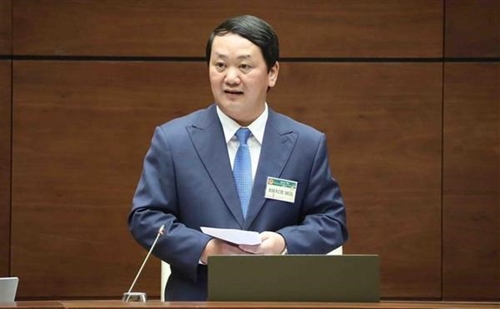Answering the question by Hanoi representative Vu Thi Luu Mai on a number of documents that do not match the regulations of the law, Lenh admitted that there are still conflicts and overlapping in documents guiding the implementation of policies to encourage investment in ethnic minority-inhabited areas.
The Government has asked ministries and sectors to review all the documents to ensure that they are coherent and suitable with legal regulations, he said, adding that ministries and agencies have completed the work.
    |
 |
Minister-Chairman of the Government Committee on Ethnic Minority Affairs Hau A Lenh answers National Assembly deputies' questions at the session.
|
Responding to a question on criteria to define mountainous areas, Lenh said that the committee is working on a new set of criteria with major foundation of terrain, administrative border and level of development to make suitable investment in the new period. It will submit a report on the work to the National Assembly Standing Committee in September, he said.
Over the concerns of Lang Son representative Chu Thi Hong Thai on whether the current policies are strong enough to encourage residents in border areas, mostly from ethnic groups, to stay there and attract laborers to the areas, Lenh said that despite the Party and State’s great attention to border areas in 25 border localities, the socio-economic situation in border communes and districts has remained difficult.
He said that stronger policies are needed to improve the living conditions of border communities in the coming time, along with the reviewing of the implementation of a Politburo’s resolution on strategy on national border protection to design more suitable policies, focusing on infrastructure systems and livelihoods for the communities.
Agreeing with Quang Nam representative Phan Thai Binh on the necessity to design mechanisms and policies to attract investment to ethnic group-inhabited areas, Lenh said that he hopes localities will stick to central policies to offer incentives to investors, encouraging them to invest in such areas to create more jobs.
Regarding deputies’ opinion to turn the content on developing livelihoods under the forest canopy into a resolution, Lenh said that the issue is related to the Forestry Law. The Government has assigned the Ministry of Agriculture and Rural Development to build a project to exploit the values of the diversity of the forest ecosystem, which includes the development of developing livelihoods under the forest canopy.
Concluding Lenh’s answer-and-question session at the National Assembly, National Assembly Chairman Vuong Dinh Hue said that 28 National Assembly deputies raised their questions and seven others joined discussions.
Through the session, it can be seen that the implementation of ethnic minority-related policies has produced important results, leading to positive changes in the living conditions of ethnic communities, strengthening political security, social order and the national great solidarity bloc, and reinforcing the communities’ trust in the Party and State.
However, the National Assembly leader pointed to a number of shortcomings in the process, including the slow implementation and modest results of the national target programs, especially the one on boosting socio-economic development in ethnic group-inhabited and mountainous areas, along with problems in guiding documents.
The top legislator asked the Government and heads of ministries, sectors and agencies to absorb the ideas of National Assembly deputies and roll out measures to settle the current problems, while effectively implementing the Politburo, National Assembly and Government’s resolutions on the work, and reviewing relevant policies to make necessary adjustments.
Particularly, the National Assembly leader stressed the need to effectively implement the national target program on boosting socio-economic development in ethnic minority-inhabited and mountainous areas in the 2021-2030 period, as well as policies to provide support in residential and farming land and the change of the way to earn a living to ethnic minority communities.
Source: VNA